
Ours is an age of pedagogy. Anxious parents instruct their
Ours is an age of pedagogy. Anxious parents instruct their children more and more, at younger and younger ages, until they're reading books to babies in the womb.






"Ours is an age of pedagogy. Anxious parents instruct their children more and more, at younger and younger ages, until they're reading books to babies in the womb." These words by Alison Gopnik strike at the very heart of modern parenting and education, shedding light on a growing tension in the way we approach the upbringing of the next generation. In her reflection, Gopnik warns of a society increasingly obsessed with early education, where the natural development of a child is often overshadowed by the pressure to prepare them for an ever-competitive world. The image of parents reading to their unborn children, while evocative, speaks not only of the desire to shape the future but also of the anxiety and urgency with which we view the future of our children.
In an age where knowledge is prized above all else, there is a growing belief that the earlier we begin to teach, the better the outcome. Yet, this unrelenting drive for early education often overlooks the simple truth that childhood is not merely a preparation for adulthood but a time to explore, discover, and develop at a natural pace. The pace of learning should not be rushed, for the wisdom of the world is not merely found in books or early lessons, but in the quiet moments of exploration and imaginative play. Gopnik’s quote calls for a return to a deeper understanding of childhood—one that allows for organic development rather than one defined by performance.
Consider the great philosopher Aristotle, whose wisdom was cultivated not through strict, early schooling but through years of observing the world around him. He did not arrive at profound insights through structured lessons alone; his thinking was shaped by the time he spent in quiet reflection, walking the streets, observing nature, and engaging with others. His teachings did not solely come from books, but from the deeper understanding that true learning is rooted in experience, not just instruction. Aristotle’s approach serves as a reminder that a well-rounded education is one that allows for freedom, time to grow, and space to engage with the world on one's own terms.
Yet, in today’s world, the emphasis on early learning is relentless. Parents, filled with anxiety about the future, feel the pressure to give their children a head start from the moment they are born. The idea that reading books to babies in the womb will somehow ensure their success is an extreme manifestation of this fear—a belief that education must be continuous and unyielding. Modern society has shifted from allowing children the natural rhythms of growth to imposing an artificial sense of urgency upon them. The result is often a generation of children burdened by expectations and pressured to perform before they even have a chance to fully understand the world around them.
Consider the story of Helen Keller, whose remarkable life was shaped not by the early pressures of an educational system, but by the deep connection she had with her teacher, Anne Sullivan. Sullivan did not rush Keller through an academic curriculum, but instead took the time to understand the unique challenges Keller faced. She allowed Keller to grow at her own pace, providing the guidance and support needed to help her realize her potential. Keller’s success did not come from being pushed at an early age but from the patient and thoughtful mentorship that allowed her to flourish on her own terms.
The lesson here is clear: education is not a race. It is not about how early one starts or how quickly one advances. True learning is about the process—the exploration, the questioning, the deepening of understanding over time. Rushed learning, driven by the fear of missing out or falling behind, often leads to the stifling of curiosity, the very quality that fuels true understanding. As we face the challenges of raising children in an anxious world, we must remember that wisdom is not found in the speed at which we accumulate knowledge but in the depth of the experiences we allow our children to have.
Practical action for parents, educators, and society at large is to slow down, to step back and let children be children. Allow them the space to grow and explore without the constant push to achieve. There is great value in play, in unstructured time, in allowing children to encounter the world without the burden of rigid expectations. Let us not forget that the greatest minds of history, from Aristotle to Helen Keller, did not become who they were because of pressure and instruction alone, but because of the freedom to grow, to question, and to learn at their own pace.
In conclusion, Alison Gopnik’s words remind us of the importance of balance in education. It is not the speed or the intensity with which we teach that defines success, but the depth of understanding, the freedom to explore, and the space to grow. Let us teach the children of today not just to race toward the future, but to embrace the journey of learning, one step at a time.






AAdministratorAdministrator
Welcome, honored guests. Please leave a comment, we will respond soon